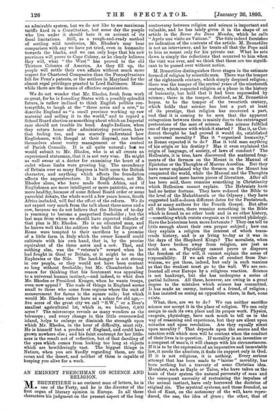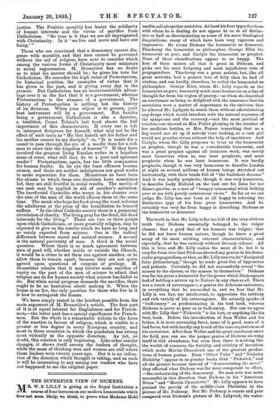AN EMINENT FRENCHMAN ON SCIENCE AND RELIGION.
Air BRUNETIERE is an eminent man of letters, he is 1Y-L. • one of the Forty, and he is the director of the first organ of literary opinion in Europe. In all these characters his judgment on the present aspect of the long controversy between religion and science is important and valuable, and he has lately given it in the shape of an article in the Revue des Deux Honda, which he calls " Apres une visite au Vatican." The title indeed furnishes no indication of the contents of the article. M. Brunetiere is not an interviewer, and he treats all that the Pope said to him as meant only for his private ear. What he sets down is simply the reflections that occurred to him when the visit was over, and we think that these are too signifi- cant to be passed over without notice.
M. Brunetiere distinguishes three stages in the estimate formed of religion by scientific men. There was the temper of the eighteenth century, which simply despised religion; there was the temper of the central years of the nineteenth century, which respected religion as a phase in the history of humanity, but held that it had been superseded by science ; there is the temper, destined, as M. Brunetiere hopes, to be the temper of the twentieth century, which holds that science has lost a part at least of its prestige, that religion has recovered a part, and that it is coming to be seen that the apparent antagonism between them is mainly due to the extravagant pretensions of the men of science. Has science fulfilled one of the promises with which it started ? Has it, as Con- dorcet thought he had proved it would do, established a universal morality ? Has it " organised humanity," as Renan expected it to do ? Has it told man anything of his origin or his destiny ? Has it even explained the origin of language, of society, of laws of conduct ? The Hellenists, it is true, have discovered the scattered frag- ments of the Sermon on the Mount in the Manual of Epictetus or the Thoughts of Marcus Aurelius. But they have never explained why the Sermon on the Mount has conquered the world, while the Manual and the Thoughts have remained mere barren pieces of literature. After all has been said, there remains something in Christianity which Hellenism cannot explain. The Hebraists have had no better fortune. They have reduced the Bible' to the level of the Mahabharata or the Odyssey ; they have suggested half-a-dozen different dates for the Pentateuch, and as many authors for the Fourth Gospel. But after all their labours, there remains something in the Bible which is found in no other book and in no other history, —something which resists exegesis as it resisted philology. Have the historians been more fortunate ? They can tell us little enough about their own proper subject ; how can they explain a religion the interest of which trans- cends history, and is as living to-day as it was in the days of the Shepherd Kings ? The moralists, when they have broken away from religion, are just as much at sea. Physiology cannot prove or disprove the freedom of the will, it cannot explain the sense of responsibility. If we ask rules of conduct from Dar- winism, we get them, indeed, but only in such maxims as that the weakest must go to the wall. We are con- fronted all over Europe by a religious reaction. Science is not bankrupt, but she has undergone a series of partial failures. All these, however, are owing in a great degree to the mistakes which science has committed. It has made an enemy, instead of a friend, of religion ; it has insisted on seeing an opposition where, in fact, none exists.
What, then, are we to do ? We can neither sacrifice science nor accept it in the place of religion. We can only assign to each its own place and its proper work. Physics, exegesis, physiology, have each much to tell us in the way of reasoning and experience, but they are silent upon miracles and upon revelation. Are they equally silent upon morality ? That depends upon the source and the sanction with which men will be content when the conduct of their lives is in question. If morality is an invention or a conquest of man's, it will change with his circumstances. If it is to be the expression of an imperative and immutable law, it needs the absolute, it finds its support only in God. If it is not religious, it is nothing. Every serious attempt that has been made to " laicise " morality, has been nothing but a travesty of some Christian idea. Moralists, such as Bayle or Taine, who have taken as the basis of their system the natural perversity of man and the consequent necessity of restraining the impulses of the animal instinct, have only borrowed the doctrine of original sin. The mystical systems, and those founded, as that of Kant, on the autonomy of the will, have repro- duced, the one, the idea of grace ; the other, that of justice. The Positive morality has learnt the solidarity of human interests and the virtue of sacrifice from Catholicism. " So true is it that we are all impregnated with Christianity. In it we live and move and have our being.' " Those who are convinced that a democracy cannot dis- pense with morality, and that men cannot be governed without the aid of religion, have next to consider which among the various forms of Christianity most ministers to moral regeneration. M. Brunetiere has no doubt as to what his answer should be; he gives his vote for Catholicism. He concedes the high value of Protestanism, its historical position, the examples of virtue that it has given in the past, and is giving every day in the present. But Catholicism has an incontrovertible advan- tage over it in the fact that it is a government, whereas Protestantism is the absence of a government. The history of Protestantism is nothing but the history of its divisions. When your object is to govern, your best instrument will be a government. But besides being a government, Catholicism is also a doctrine, a tradition, Count Tolstoi's last book shows the full importance of this characteristic. If every one is left to interpret Scripture for himself, what may not be the effect of such texts as "He that hateth not his father and his mother cannot be my disciple," or, "It is easier for a camel to pass through the eye of a needle than for a rich man to enter into the kingdom of heaven"? If they have involved. the greatest living Russian writer in a hopeless maze of error, what will they do to a poor and ignorant reader P Protestantism, again, has too little compassion for human frailty. In its eye the least offences become crimes, and there are neither indulgences nor good works to make reparation for them. Monstrous as have been the abuses to which these two doctrines have sometimes led, they are still fruitful in social results. The merits of one man may be applied. in aid. of another's salvation. The barefooted Carmelite who weeps in his cloister over the sins of the man of the world effaces them at the same time. The monk who begs his food along the road redeems the adulteress at the price of the humiliation he himself suffers. " In the ideal Catholic society there is a perpetual circulation of charity. The living pray for the dead, the dead intercede for the living." There are two or three points upon which Catholicism, or more generally religion, may be expected to give us the results which we have so long and so vainly expected. from science. One is the radical difference between moral and natural science. A second is the natural perversity of man. A third is the social question. Where there is so much agreement between men of good will, whether inside or outside the Church, it would. be a crime to set them one against another, or to allow them to remain apart, because they are not quite agreed. upon questions of exegesis or geology. M. Brunetiere admits that it may involve some sacrifice of vanity on the part of the men of science to admit that religion can do for human society what science has failed to do. But when social progress demands the sacrifice, there ought to be no hesitation about making it. When the house is on fire, the only question for those who live in it is how to extinguish the flames.
We have simply stated in the briefest possible form the main argument of M. Brunetiere's article. The first part of it is of equal interest for Englishmen and for French- men,—the latter part has a special significance for French- men. But the whole is a remarkable tribute to the force of the reaction in favour of religion, which is visible in a greater or less degree in every European country, and most in those countries in which the pendulum has swung most violently in the opposite direction. As yet, no doubt, this reaction is only beginning. Like other similar changes, it shows itself among the leaders of thought, while the mass of thinking men and women are still where those leaders were twenty years ago. But it is an indica- tion of the direction which thought is taking, and as such it will be interesting to any among our readers who have not happened to see the original paper.



















































 Previous page
Previous page